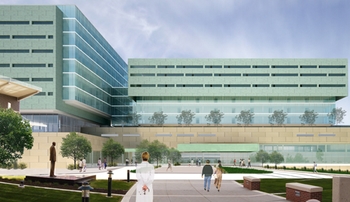The Omaha City Council on Tuesday introduced two measures that ultimately would provide $35 million to help construct the $370 million Cancer Center Campus at the medical center.
 |
An occupational tax on Omaha’s tobacco vendors could help generate $35 million for the UNMC Cancer Center Campus. |
One ordinance would provide $3.5 million for each of the next 10 years to the project. The other ordinance would raise the money necessary by implementing a 7 percent occupation tax on retailers who sell tobacco products.
“We are grateful that the City of Omaha is interested in supporting the Cancer Center, which will cement Omaha’s reputation as a leader in cancer care, save lives and provide state-of-the-art treatment and research,” said Kenneth Cowan, M.D., Ph.D., director of the UNMC Eppley Cancer Center. “It also will create thousands of jobs in the metro area and infuse millions into state and local economies.”
A public hearing on the two ordinances is planned for Tuesday (Sept. 25). The Council likely will vote on the measures on Oct. 2.
Public support
The funds from the occupation tax, along with $5 million that Douglas County has committed to the project, would be secured as part of a public-private fundraising effort that aims to raise $200 million for the cancer center.
The $200 million — along with $50 million from the state and $120 million being borrowed by The Nebraska Medical Center — will make the landmark construction project a success, Dr. Cowan said.
Benefits for Omaha
The cancer center is predicted to:
- Provide nearly 4,800 jobs during construction.
- Add 1,200 jobs at the medical center – each with an average salary of approximately $70,000.
- Create an additional 3,457 ongoing jobs throughout the Omaha metro area.
- Infuse $537 million annually into the city and state economy.
“If they support the project, employees may inform members of the city council about the project’s benefits, ask them for their vote and thank those who are supportive,” said Bob Bartee, vice chancellor for external affairs.
Employees and students who want to do so must contact city council members on their own time and without using university resources (computers, telephones, letterhead or university accounts).